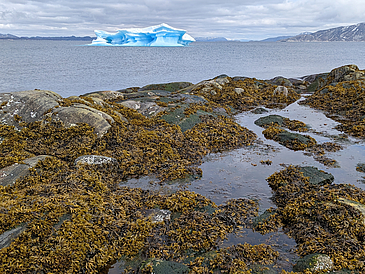SEA-Quester is investigating carbon cycling in novel marine polar ecosystems that are expected to emerge due to climate change. Melting sea-ice, changing currents, and a warmer ocean are already changing species distributions, behaviors, and metabolism. How these will further affect marine biodiversity and ecosystem functions and services in the polar seas, such as carbon sequestration or fishery production, is not well understood. However, this has potentially a major impact on meeting policy targets for biodiversity and climate change mitigation.
SEA-Quester will tackle these unknowns through a combination of field observations and modelling. Field cruises to the fjords and shelf seas around Greenland and Svalbard, in addition to the Southern Ocean, will serve to investigate the uptake and storage of carbon as it moves from coastal ecosystems (such as kelp forests) to the open ocean. This will be done as this is where biological processes related to plankton, fish, and bottom-dwelling organisms play an important role in determining the ultimate fate of the carbon our oceans draw from the atmosphere.
These new insights are not only relevant for improved modeling of the global ocean, but will also be showcased in new management tools, such as a biological sequestration amplification factor and maps of blue carbon sequestration potential. These new tools will help tackle the challenges and address conflicts in protecting and managing Arctic marine areas, while at the same time shedding light on the mitigation potential of natural carbon sequestration processes.
“Within the frame of SEA-Quester our team will study emerging seaweed ecosystems in areas which were formerly dominated by ice,” outlines Kai Bischof, a professor of marine botany at the University of Bremen, which will receive a share of funding amounting to approximately 500,000 euros.
SEA-Quester is running from February 01, 2024, to January 31, 2028, and is a collaboration between the following institutes: Technical University of Denmark, DTU Aqua – National Institute of Aquatic Resources (Denmark, lead), University of Bremen and MARUM (Germany), Greenland Nature Institute, Greenland Climate Research Centre, (GINR - Grönland), Alfred-Wegener Institute, Helmholtz Centre for Polar & Marine Research (Germany), Leibniz-Institute for Baltic Sea Research (IOW – Germany), ABO Academy (Finland), Institute of Oceanology, Polish Academy of Sciences (IOPAN), GRID-Arendal (Norway), Helmholtz-Zentrum Hereon (Germany), and Aarhus University (Denmark).
Further Information:
Contact:
Prof. Dr. Kai Bischof
Marine Botany
Faculty 02: Biology / Chemistry
University of Bremen
Phone: +49 421 218-63050
Email: kbischof@uni-bremen.de

